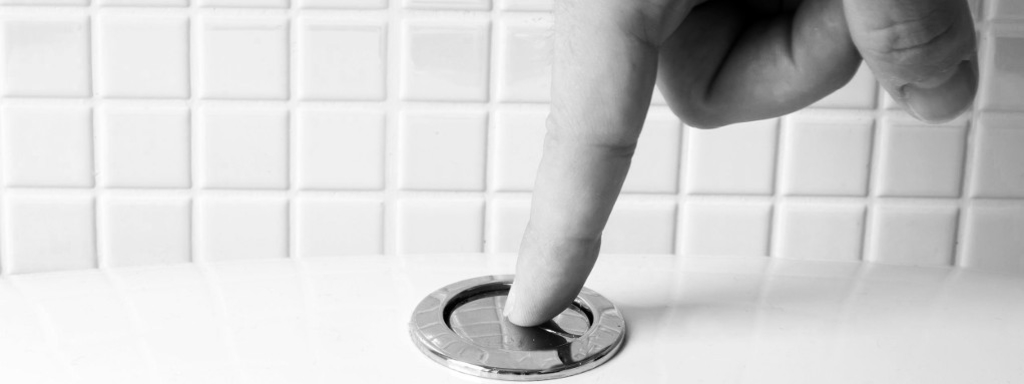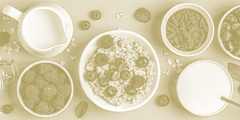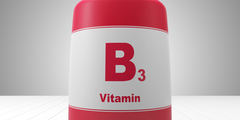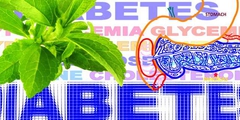
Dat psyllium helpt tegen constipatie, weten veel mensen wel. Minder bekend is dat psyllium net zo goed helpt tegen fecale incontinentie als loperamide, de nuchtere bloedglucosespiegel bij diabetes type 2 net zo goed verlaagt als metformine en ulceratieve colitis net zo goed onder controle houdt als mesalazine. Dit artikel geeft een overzicht van de gezondheidseffecten en klinische toepassingen van psylliumvezels.
Beste bezoeker, u heeft geen toegang.
Enkel (web)abonnees hebben toegang tot tijdschriftartikelen. Het webabonnement is nog in de maak.
U kunt zich wel alvast (gratis) registreren en tal van andere webartikelen raadplegen!
Verschenen in
Referenties
Jones JM. CODEX-aligned dietary fiber definitions help to bridge the 'fiber gap'. Nutr J. 2014;13:34.
Institute of Medicine. Dietary Reference Intakes: The Essential Guide to Nutrient Requirements. Washington, DC: The National Academies Press, 2006:110-121.
Slavin J. Fiber and prebiotics: mechanisms and health benefits. Nutrients 2013;5:1417-1435.
Gezondheidsraad Nederland. Richtlijn voor de vezelconsumptie, 2006. http://www.gezondheidsraad.nl/sites/default/files/Richtlijn%20voor%20de%...
Eaton SB et al. Diet-dependent acid load, Paleolithic nutrition, and evolutionary health promotion. Am J Clin Nutr. 2010;91(2):295-7.
Madgulkar AR et al. Characterization of psyllium (Plantago ovata) polysaccharide and its uses. In: Polysaccharides, Bioactivity and Biotechnology, 2015:871-890.
Wong C et al. Potential benefits of dietary fibre intervention in inflammatory bowel disease. Int J Mol Sci. 2016;17(6).
Marlett JA et al. The active fraction of psyllium seed husk. Proc Nutr Soc. 2003;62(1):207-9.
Pal S et al. The effect of a fibre supplement compared to a healthy diet on body composition, lipids, glucose, insulin and other metabolic syndrome risk factors in overweight and obese individuals. Br J Nutr. 2011;105(1):90-100.
Eswaran S et al. Fiber and functional gastrointestinal disorders. Am J Gastroenterol 2013;108:718-727.
Marlett JA et al. An unfermented gel component of psyllium seed husk promotes laxation as a lubricant in humans. Am J Clin Nutr. 2000;72:784-789.
Mehmood MH et al. Pharmacological basis for the medicinal use of psyllium husk (ispaghula) in constipation and diarrhea. Dig Dis Sci. 2011;56:1460-1471.
Tedelind S et al. Anti-inflammatory properties of the short-chain fatty acids acetate and propionate: a study with relevance to inflammatory bowel disease. World J Gastroenterol. 2007;13(20):2826-32.
Hamer HM et al. Review article: the role of butyrate on colonic function. Aliment Pharmacol Ther. 2008;27(2):104-19.
Pylkas AM et al. Comparison of different fibers for in vitro production of short chain fatty acids by intestinal microflora. J Med Food 2005;8:113-116.
Rodriguez-Cabezas ME et al. Intestinal anti-inflammatory activity of dietary fiber (Plantago ovata seeds) in HLA-B27 transgenic rats. Clin Nutr. 2003;22:463-471.
King DE et al. Effect of a high-fiber diet vs. a fiber-supplemented diet on C-reactive protein level. Arch Intern Med. 2007;167:502-506.
King DE et al. Effect of psyllium fiber supplementation on C-reactive protein: the trial to reduce inflammatory markers (TRIM). Ann Fam Med. 2008;6:100-106.
Vega-López S et al. Sex and hormonal status influence plasma lipid responses to psyllium. Am J Clin Nutr 2001;74:435–41.
Galisteo M et al. Plantago ovata husks-supplemented diet ameliorates metabolic alterations in obese Zucker rats through activation of AMP-activated protein kinase. Comparative study with other dietary fibers. Clin Nutr. 2010;29(2):261-7.
Khossousi A et al. The acute effects of psyllium on postprandial lipaemia and thermogenesis in overweight and obese men. British Journal of Nutrition 2008;99:1068-1075.
Togawa N et al. Gene expression analysis of the liver and skeletal muscle of psyllium-treated mice. Br J Nutr. 2013;109:383-393.
WHO monographs on selected medicinal plants, volume 3, 2007:268-282.
Cicero AF et al. Different effect of psyllium and guar dietary supplementation on blood pressure control in hypertensive overweight patients: a six-month, randomized clinical trial. Clin Exp Hypertens. 2007;29(6):383-94.
Gibb RD et al. Psyllium fiber improves glycemic control proportional to loss of glycemic control: a meta-analysis of data in euglycemic subjects, patients at risk of type 2 diabetes mellitus, and patients being treated for type 2 diabetes mellitus. Am J Clin Nutr 2015;102:1604-14.
Brum JM et al. Satiety effects op psyllium in healthy volunteers. Appetite 2016;105:27-36.
McRorie JW Jr. Evidence-based approach to fiber supplements and clinically meaningful health benefits, part 1: What to look for and how to recommend an effective fiber therapy. Nutr Today. 2015;50(2):82-89.
Sánchez D et al. Dietary fiber, gut peptides, and adipocytokines. J Med Food. 2012;15(3):223-30.
Karhunen LJ et al. A psyllium fiber-enriched meal strongly attenuates postprandial gastrointestinal peptide release in healthy young adults. J Nutr. 2010;140(4):737-44.
Hussain SS et al. The regulation of food intake by the gut-brain axis: implications for obesity. Int J Obes (Lond). 2013;37(5):625-33.
Galisteo M et al. A diet supplemented with husks of Plantago ovata reduces the development of endothelial dysfunction, hypertension, and obesity by affecting adiponectin and TNF-alpha in obese Zucker rats. J Nutr. 2005;135(10):2399-404.
Pal S et al. The effects of 12-week psyllium fibre supplementation or healthy diet on blood pressure and arterial stiffness in overweight and obese individuals. Br J Nutr. 2012;107:725-34.
Obata K et al. Dietary fiber, psyllium, attenuates salt-accelerated hypertension in stroke-prone spontaneously hypertensive rats. J Hypertens. 1998;16(12 Pt 2):1959-64.
Sahagún AM et al. Study of the protective effect on intestinal mucosa of the hydrosoluble fiber Plantago ovata husk. BMC Complement Altern Med. 2015;15:298.
Diemel JM et al. NHG-Standaard Obstipatie. Huisarts Wet 2010;53(9):484-98.
Avila JG. Pharmacologic treatment of constipation in cancer patients. Cancer Control. 2004;11(3 Suppl):10-8.
Gabrielli F et al. Psyllium fiber vs. placebo in early treatment after STARR for obstructed defecation: a randomized double-blind clinical trial. Minerva Chir. 2016;71(2):98-105.
Plantago ovata. (Psyllium). Altern Med Rev. 2002;7(2):155-9.
Bliss DZ et al. Dietary fiber supplementation for fecal incontinence: a randomized clinical trial. Res Nurs Health. 2014;37(5):367-78.
Markland AD et al. Loperamide versus psyllium fiber for treatment of fecal incontinence: the Fecal Incontinence Prescription (Rx) Management (FIRM) randomized clinical trial. Dis Colon Rectum. 2015;58(10):983-93.
Murphy J et al. Testing control of radiation-induced diarrhea with a psyllium bulking agent: a pilot study. Can Oncol Nurs J. 2000;10(3):96-100.
Halmos EP et al. A diet low in FODMAPs reduces symptoms of irritable bowel syndrome. Gastroenterology 2014;146:67-75.
Bijkerk R et al. Soluble or insoluble fibre in irritable bowel syndrome in primary care? Randomised placebo controlled trial. BMJ. 2009; 339: b3154.
Paulo AZ et al. Low-dietary fiber intake as a risk factor for recurrent abdominal pain in children. Eur J Clin Nutr. 2006;60:823-827.
Shulman RJ et al. Psyllium fiber reduces abdominal pain in children with irritable bowel syndrome in a randomized, double-blind trial. Clin Gastroenterol Hepatol. 2016 Apr 11. pii: S1542-3565(16)30021-0.
Alonso-Coello P et al. Laxatives for the treatment of hemorrhoids. Cochrane Database Syst Rev. 2005;(4):CD004649.
Petruzziello L et al. Review article: uncomplicated diverticular disease of the
colon. Aliment Pharmacol Ther. 2006;23(10):1379-91.
Fujimori S et al. High dose probiotic and prebiotic cotherapy for remission induction of active Crohn's disease. J Gastroenterol Hepatol. 2007;22(8):1199-204.
Fujimori S et al. A randomized controlled trial on the efficacy of synbiotic versus probiotic or prebiotic treatment to improve the quality of life in patients with ulcerative colitis. Nutrition. 2009;25(5):520-5.
Cappa C et al. Influence of Psyllium, sugar beet fibre and water on gluten-free dough properties and bread quality. Carbohydr Polym. 2013;98(2):1657-66.
Fradinho P et al. Developing consumer acceptable biscuits enriched
with Psyllium fibre. J Food Sci Technol. 2015;52(8):4830-4840.
Zandonadi RP et al. Psyllium as a substitute for gluten in bread. J Am Diet Assoc. 2009;109(10):1781-4.
Uehleke B et al. Cholesterol reduction using psyllium husks - do gastrointestinal adverse effects limit compliance? Results of a specific observational study. Phytomedicine. 2008;15(3):153-9.
Anderson JW et al. Cholesterol-lowering effects of psyllium intake adjunctive to diet therapy in men and women with hypercholesterolemia: meta-analysis of 8 controlled trials. Am J Clin Nutr. 2000;71:472-479.
MacMahon M et al. Ispaghula husk in the treatment of hypercholesterolaemia: a double-blind controlled study. J Cardiovasc. Risk 1998;5:167-172.
Brown L et al. Cholesterol-lowering effects of dietary fiber: a meta-analysis. Am J Clin Nutr. 1999;69:30-42.
Morán S et al. Effects of fiber administration in the prevention of gallstones in obese patients on a reducing diet. A clinical trial. Rev Gastroenterol Mex. 1997;62(4):266-72.
Fogelholm M et al. Dietary macronutrients and food consumption as determinants of long-term weight change in adult populations: a systematic literature review. Food Nutr Res. 2012;56.
Lairon D. Dietary fiber and control of body weight. Nutr Metab Cardiovasc Dis. 2007;17(1):1-5.
Schulz M et al. Identification of a food pattern characterized by high-fiber and low-fat food choices associated with low prospective weight change in the EPIC-Potsdam cohort. J Nutr. 2005;135(5):1183-9.
Pal S et al. Effects of psyllium on metabolic syndrome risk factors. Obes Rev. 2012;13(11):1034-47.
Giacosa A et al. The right fiber for the right disease: an update on the psyllium seed husk and the metabolic syndrome. J Clin Gastroenterol. 2010;44 Suppl 1:S58-60.
de Bock M et al. Psyllium supplementation in adolescents improves fat distribution & lipid profile: a randomized, participant-blinded, placebo-controlled, crossover trial. PLoS One. 2012;7(7):e41735.
Hall M. Do fiber and psyllium fiber improve diabetic metabolism? Consult Pharm. 2012;27(7):513-6.
Ziai SA et al. Psyllium decreased serum glucose and glycosylated hemoglobin significantly in diabetic outpatients. J Ethnopharmacol. 2005;102(2):202-7.





